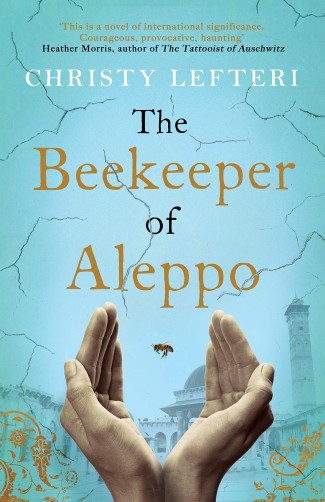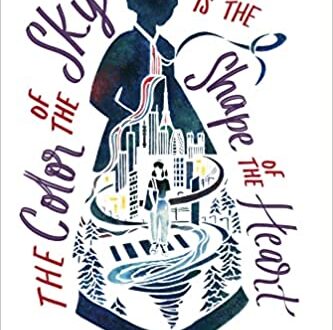The Beekeeper of Aleppo by Christy Lefteri
The Beekeeper of Aleppo by Christy Lefteri is an outstanding, but haunting book. It’s part of a category of book that many people feel is worn out and overused, stories of people in and escaping war. Yet it manages to stand out in the crowd. Unlike many of such stories, it is not by a specific person’s life. It is also not a Holocaust story. Instead, as the title suggests, this story focuses on the civil war in Syria.
The civil war in Syria continues to rage on. Refugees continue to flood into neighbouring countries and across the oceans. As these people are welcomed into new homes, part of the story is often left out – that of their harrowing escape. In The Beekeeper of Aleppo, we are able to take a peak at that part of the story. It’s something that nobody wants, yet many people must face. The Beekeeper of Aleppo is a story of immigration and sacrifice. Through her time working with refugees and as a child of refugee parents, Christy Lefteri builds us a nuanced story – one we must all take the time to learn.
The Story

The Beekeeper of Aleppo follows the story of Nuri and his wife Afri as they make their way from Aleppo to the shores of the U.K., where they are seeking asylum. Before the war, Nuri was a beekeeper and Afra, an artist. They lived together in Aleppo with their young son, Sami. However, from the very beginning of the book, we learn that this is no longer the case. Sami is gone and all that is left are the empty shells of Nuri and Afra and the memory of a mysterious boy named Mohammed.
As the two wait restlessly for their asylum hearing to take place, the narrator, Nuri, floats seamlessly between the current and the earlier events of their journey together. He begins with memories from prior to the war, when trouble was only brewing, and gradually moves towards the present. It is not only a story of Nuri and Afra’s losses, but also of their trauma and how they must overcome it.
Trauma and the Mind
Lefteri’s masterful writing portrays how deeply trauma can affect our lives and how it dares to eat apart everything we have. She does this not only through her precise storytelling, but through her format. The book is divided into both chapters and sections. While the chapters are clear and concise, this is lost when transitioning to a new section. Some sections last several chapters, whereas others transition much sooner. This is the case with the first chapter, which halfway through transitions mid-sentence using the word “bronze”. In an instant, readers are thrown from the present and into Nuri’s memory of the past.
It is natural to assume that the story of a refugee may be filled with traumatic events. However, the method of transition used in The Beekeeper of Aleppo shows just how insidious trauma is and how hides in the depths of our minds. Early on, we can assume that Nuri may not be the most reliable narrator. This becomes even more clear as Afra begins to show her concern for his wellbeing as the story progresses.
That being said, Nuri’s vivid memories are exactly what make the narrative so compelling and easily digested. The close connection to Nuri this gives can sometimes take away your breath as you are bashed around together with him. You feel the ups and downs just as he feels them. Both his joys and sorrows are clear to the reader. It isn’t hard to imagine being surrounded by his bees or by the water of the Mediterranean Sea. It’s just absolutely wonderfully executed.
Apolitically Political
Another point that made this novel so easily digestible was how casually the politics were nestled into the narrative. Christy Lefteri has included only the essential within The Beekeeper of Aleppo. Neither Nuri or the other characters who appear in the book dwell for a long time on the political situation in any of the countries they are in. Events and stories are focused on the individual experience, not what is right and wrong.
This may be negative for some people. However, we see the political in the news. The Syrian War rages on and there’s no simple answer to why it started and clearly no simple solution. The Beekeeper of Aleppo is not an academic work analyzing the mechanisms of war. It is simply a novel trying to bring the experiences of thousands of people to life. It goes without saying that no portrayal is going to be perfect. However, Lefteri has clearly taken extreme care to focus on the human aspect of her characters and their story – not the political agendas of outsiders.
In Conclusion
The Beekeeper of Aleppo is a difficult book. The subject matter is at times disturbing and extremely dark. Yet there is hope within that darkness. As a reader, you are left with a strong desire for Afra and Nuri to succeed and find a new happiness. It’s an incredibly hopeful book despite its dark themes. In other words, The Beekeeper of Aleppo teaches us to be both empathic and humble.
Empathy is simply something that traditional media doesn’t always do well. However, in a novelized form, readers are more ready to accept and learn from the feelings of others. It is easier to relate to others when you are seeing the world through their eyes. It is easier to accept that we can’t know everything – that all lived experiences are unique.
Christy Lefteri has created a stunning work of art and it deserves to be read by absolutely everyone



